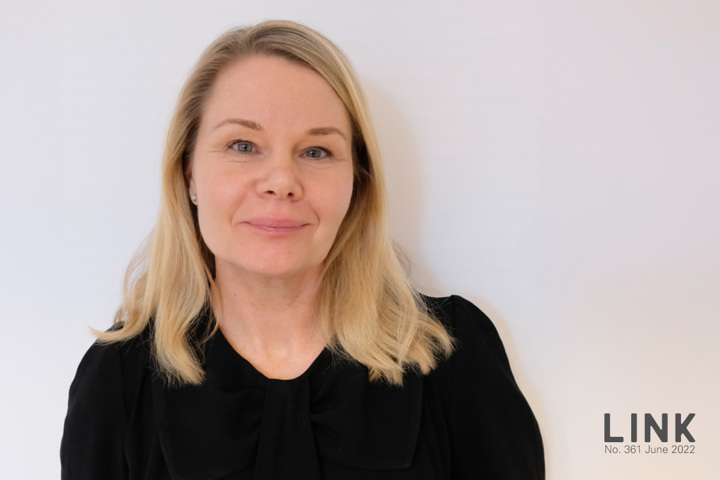
Making use of the similarities and strengths shared between Sweden and the UK
6 July 2022
Sweden and the UK is a world leading duo within the area of life sciences. With pioneering innovation, found in businesses such as Swedish-British AstraZeneca and Swedish Elekta, it is clear that the partnership has led to ground breaking research of great value – not only for our two countries, but for patients all around the world. This year, a new Office for Science and Innovation was launched at the Embassy of Sweden in London, to ensure that Sweden and the UK continue to walk side by side. The Link spoke to Marika Amartey, Innovation and Science Counsellor at the Embassy, who heads the new office, about what it means for the Swedish-British business community.
“Sweden and the UK are both leading nations within innovation and research, and we have a history of a very strong collaboration. It has been going on for decades, which is a great strength when it comes to building further on our bilateral relationship,” says Marika.
On 27 May, the Swedish Minister for Education, Anna Ekström and the UK Parliamentary Under-Secretary for Innovation at the Department of Health and Social Care, Lord Kamall, signed a Memorandum of Understanding (MoU) to show their mutual commitment to an ongoing UK-Swedish co-operation in the life sciences, in the presence of Their Majesties the King and Queen of Sweden. The agreement is one of several building blocks in an already close relationship and aims to both formalise and develop collaboration in life sciences even further.
Old Friendship, New Office
Established on 1 January 2022 by the Swedish Government, the Office is Sweden’s seventh international office of its kind, aiming to develop and strengthen collaboration between Sweden and the UK, particularly on issues regarding life sciences, export, investment, research and innovation.
“Traditionally, Sweden and the UK have a strong collaboration, especially when it comes to research. And during the last decade, we have also seen a great exchange take place within the tech- and innovation industries, which is probably a result of our common history in research. That’s a strong reason why they started thinking about placing an innovation and research office in the UK.”
Marika says that the UK is an important partner for Sweden, and even more so, an invaluable platform for Swedish businesses looking to expand. “Sweden needs the UK in many aspects – it’s a much bigger market, much bigger country, with sometimes bigger muscles. The UK is an important partner to us, which means that we should work proactively to make our bonds stay strong. Simultaneously, Sweden is a well reputed country in the UK, known for its net zero commitments and innovation scene. I think the new Office will play a great role here.”
Bringing the Swedish I-game to the UK
The Office is working with various institutions, and on multiple levels. Areas such as climate compensation and the green recovery plan, digital infrastructure, life sciences, and aerospace, are all fields where Swedish institutions and businesses are particularly strong, hence, could play a key role in the collaboration.
“By identifying similarities and strengths between the countries, we make sure that we focus on sectors where Swedish competencies and skills will be best at use. We work with four different Swedish ministries: the Ministry of Enterprise, the Ministry of Education, the Ministry of the Environment and the Ministry of Infrastructure, and it is within these four sectors that we will put our main focus, Marika says and continues: ”Simultaneously, we will work closely with the UK’s world leading universities and research institutes, organisations and governmental authorities, as well as on regional and local levels.”
Breaking new ground for innovation
The signing of the MoU was the unofficial kick-off for the office. The next steps will be to explore key areas for future projects. Marika believes in a bottom-up approach to collaboration initiatives, which made her travel around the UK to visit different regions.
“I started looking into different regional innovation ecosystems by going to Cambridge, which has a world leading innovation ecosystem. It’s truly fascinating to see how close they work together with venture capital firms, accelerators, incubators, hospitals and Cambridge University, and how they are all coordinated. Now I would like to learn more from other university regions like Oxford,
Edinburgh, Manchester and London, and to get a better understanding of the regional innovation ecosystems,” Marika says. ”I think that great innovation happens on local and regional levels, and that the bottom-up perspectives are the most important ones. If initiatives are demand driven, it is a lot easier to bring to a national level.”
Exploring the surroundings
With the MoU signed, Marika would like to start working with different sectors as soon as possible. After summer she plans to develop the office in different ways, and visit Dundee, St Andrews, Edinburgh and Glasgow to investigate collaboration opportunities within climate and net zero research and innovation.
Marika is currently heading a bilateral steering group, about to kick off the implementation phase for the MoU on life sciences, and she looks forward to filling the new agreement with content. The aerospace industry is an area where she will work to gain a deeper understanding, as well as continue exploring the development of the UK research and innovation funding landscape.
Join our mailing list
and keep up-to-date with the Chamber's news and events.
Read our Privacy Policy here